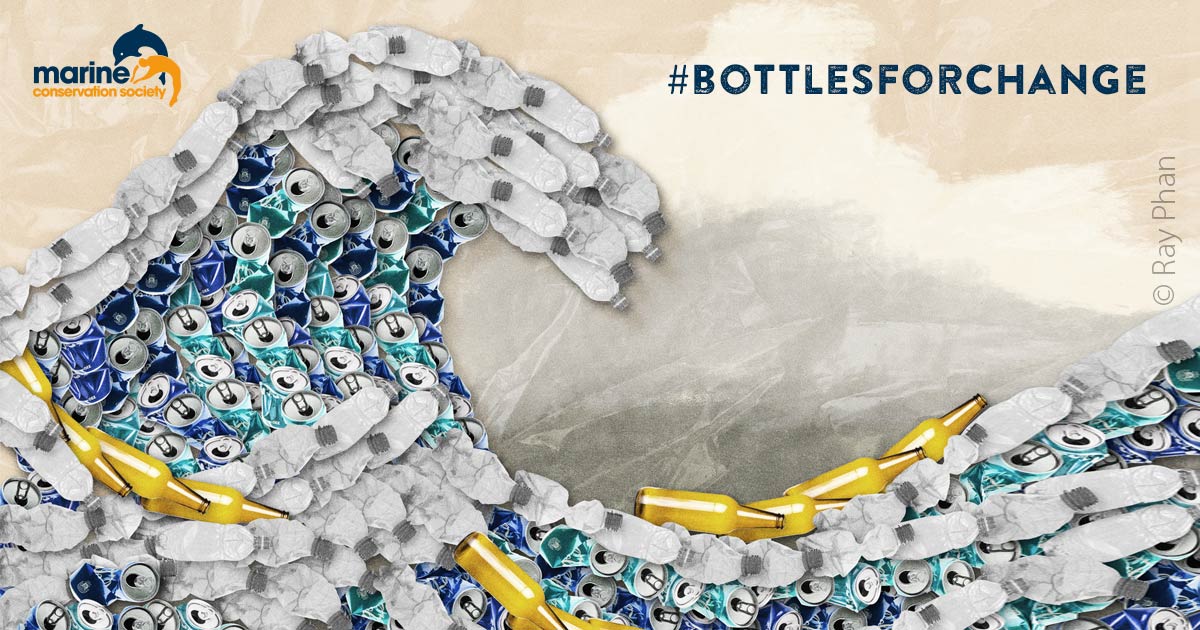Have You Committed To #BottlesForChange Yet?
With less than a week remaining until the consultation closes on a nationwide deposit-return scheme within the UK it’s time for the final push to take hold of this unique opportunity to reduce the quantity of plastic infiltrating our environment annually.
The UK proposal for the introduction of a nationwide deposit-return scheme (DRS) is part of the government’s wider Resources and Waste Strategy. By joining the Marine Conservation Society’s latest #BottlesForChange campaign to tackle plastic pollution you will be sending a consultation response for a nationwide deposit-return scheme (DRS) across the UK.
Not only will the introduction of a deposit-return scheme (DRS) enable us to get a firmer grasp on tackling plastic pollution, but it will also open up doors for economic prosperity and new social enterprises, making room for new products produced from recycled materials.
The UK’s fight against plastic pollution seems to be growing with the so-called Attenborough Effect spurring a 53% reduction in the usage of single-use plastics across the UK over the last 12 months thanks to the striking influence Blue Planet II had on the nations heartstrings.
It seems like we truly are beginning to make progress with reducing plastic here in the UK - but if we really care about plastic pollution, why are single-use water bottle sales increasing in the UK? Perhaps the convenience of a single-use plastic bottle is more important to the majority than its subsequent suffocating impact on our marine life.
If we wish to continue using these single-use plastic bottles then to prevent the further choking of our seas it seems the initiation of a nationwide deposit-return scheme is an avenue that must be explored.
Of course significantly reducing the initial production of these single-use plastic items is the most beneficial way of slowing the plastic tide, but to prevent the existing plastic bottles from entering our seas the establishment of a deposit-return scheme (DRS) is our best solution.
According to a report from the House of Commons Environmental Audit Committee around 13 billion plastic bottles are used in the UK annually, with only just over half of these being recycled (estimated 7.5 billion). The introduction of a nationwide deposit-return scheme (DRS) would provide an incentive to improve recycling rates and would also see the best return with regards to cost savings, job creation and the regeneration of our domestic recycling industry providing a massive win for marine conservation in the process.
It is integral that we take advantage of this unique opportunity to turn the plastic tide and capture the billions of drinks bottles and cans that are being buried, burned or released into the environment each year in the UK.
But What Exactly Is A Deposit-Return Scheme (DRS) And How Does It Work?
The Marine Conservation Society #BottlesForChange campaign is advocating a money-back recycling scheme which accepts drinks containers of all materials and sizes, including aluminium and TetraPaks, and is coordinated for consumers across England, Scotland, Wales and Northern Ireland, following in the ambitious footsteps of Scotland.
The only difference between the way we currently consume plastic bottles and the introduction of a deposit-return scheme is that a small deposit - likely between 10p and 25p depending on the size of the bottle - will be added to your purchase each time you buy a plastic bottled product, which will be returned to you upon returning your plastic bottles.
The Marine Conservation Society reports that deposit-return schemes currently operate in 40 other countries across the globe, from Croatia to Australia, with an observed increase in recycling rates of between 80-95%. For more FAQs regarding the proposed scheme please go to the following site - https://www.mcsuk.org/campaigns/bottles-for-change-faq
It is not beyond the realms of possibility to say that the introduction of a deposit will also indirectly result in the reduction of these plastic bottled products being purchased - as was seen with the introduction of the 5p plastic bag levy in the UK - which will force large transnational corporations to create innovative and sustainable packaging alternatives.
What Further Steps Can You Take?
The Marine Conservation Society are urging people in England, Wales and Northern Ireland to respond to the Department for Environment and Rural Affairs (DEFRA) consultation. For people from Wales, where the Assembly Government is carrying out additional local assessments, you can send your response to them using the MCS website tool at the same time. If you’re in Scotland, you can also tell DEFRA that it should introduce a system which follows the indicated ambitions of the Scottish government, because the nations of the UK need to have compatible systems, not different ones.
You can also:
Encourage businesses and organisations to sign up to support the best deposit-return scheme (DRS) possible
Promote and share the campaign on social media using the #bottlesforchange hashtag
Engage in science communication and inspire others to sign the petition wherever possible - at local events, beach cleans, even on the bus!
For more information and to pledge your support to the campaign please visit https://www.mcsuk.org/campaigns/bottles-for-change-home


